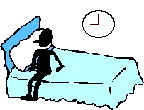In spoken English, the following contraction is often used:
| Without Contraction
|
With Contraction
|
|---|---|
| did not | didn't |
| I/he/she/it/you/we/you/they |
did not | did not have | did not read | did not like | did not eat | did not drink |
|---|---|---|---|---|---|---|
| I/he/she/it/you/we/you/they |
didn't | didn't have | didn't read | didn't like | didn't eat | didn't drink |
In order to change an affirmative statement into a negative statement, did not is placed after the subject, and the form of the verb is changed to the bare infinitive.
| Positive statement | Negative statement |
|---|---|
| I worked. | I didn't work. |
| You worked. (singular 1 and plural 1+) | You didn't work. |
| He/She worked. | He/She didn't work. |
| It worked. | It didn't work |
| We worked. | We didn't work. |
| They worked. | They didn't work. |
 |
 |
On Saturday Mr Bean didn't wake up at 6.00 am. He woke up at 8.00 am. |
 |
 |
He didn't get up at 6.15 am. He got up at 9.00 am. |
 |
 |
He didn't go to the office. He went to the bathroom. |
 |
 |
He didn't have a shower. He had a bath. |
 |
After his shower he didn't have a cup of coffee. He had a shave and brushed his teeth. | |
  |
  |
He didn't eat breakfast at about 7.00 am. He ate breakfast at about 10.00 am. |
 |
 |
After breakfast he didn't read the newspaper. He went for a run. |
 |
 |
After his run he didn't go to work. He went to meet his friends. |